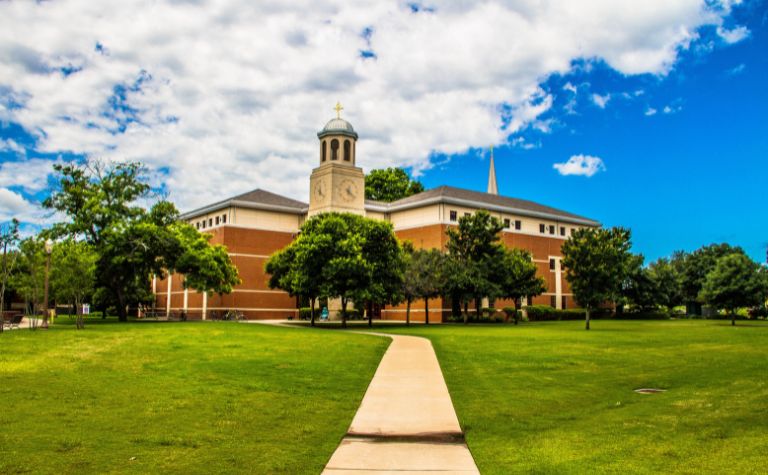If you’re interested in studying Arminian theology, choosing the right educational institution is crucial.
Arminianism, which emphasizes free will and the role of human cooperation in salvation, has a rich history and a broad influence on various Christian denominations.
This article provides an overview of nine seminaries known for their focus on Arminian theology.
These seminaries offer a range of degree programs, from divinity to pastoral counseling, and are staffed by some of the most respected scholars in the field.
Whether you’re looking to enter ministry, academia, or deepen your understanding, these seminaries offer robust programs to meet your needs.
Read on to find the institution that aligns with your academic and career goals.

Asbury Theological Seminary
Located in Wilmore, Kentucky, Asbury Theological Seminary is a well-known institution with a strong emphasis on Arminian theology.
Founded in 1923, the seminary has a long-standing reputation for academic excellence and a commitment to practical ministry training.
With a diverse faculty that includes leading scholars in Arminian thought, students can expect a comprehensive education that covers both historical and contemporary perspectives.
Degree programs range from Master of Divinity to Doctor of Ministry, and the seminary also offers online courses for those who require flexibility.
Asbury’s vibrant community fosters an environment where students can engage in meaningful discussions and form lasting connections.
Wesley Biblical Seminary
Situated in Ridgeland, Mississippi, Wesley Biblical Seminary is an institution that strongly aligns with Arminian theology.
Established in 1974, the seminary has been dedicated to providing a high-quality education that integrates scholarly rigor with practical ministry skills.
The faculty is comprised of experts in various theological disciplines, many of whom are recognized authorities in the field of Arminian studies.
Students can choose from a variety of degree programs, including Master of Divinity, Master of Arts, and Doctor of Ministry.
The seminary also offers distance learning options to accommodate those who cannot attend in person.
The campus culture is one of inclusivity and open dialogue, allowing students to explore complex theological issues in a supportive environment.

United Theological Seminary
Located in Dayton, Ohio, United Theological Seminary is a well-known institution that adheres to Arminian theology.
Founded in 1871, the seminary has a long history of academic excellence and a commitment to preparing students for various forms of ministry.
The faculty is a diverse group of scholars specializing in various theological subjects, including Arminianism.
Degree programs available at United include Master of Divinity, Master of Theological Studies, and Doctor of Ministry, among others.
For those unable to attend classes on campus, the seminary offers robust online learning options.
The institution strongly emphasizes community engagement and social justice, encouraging students to apply their theological understanding in practical ways that benefit society.
Seattle Pacific Seminary
Seattle Pacific Seminary is part of Seattle Pacific University and is situated in the scenic city of Seattle, Washington.
Established in 2009, this seminary is relatively new but has quickly gained recognition for its commitment to Arminian theology and academic rigor.
The faculty is comprised of experts in various theological disciplines, and the seminary offers a range of degree programs, including Master of Divinity, Master of Arts in Theology, and Doctor of Ministry.
One of the standout features of Seattle Pacific Seminary is its focus on interdisciplinary studies, allowing students to integrate theology with other fields such as psychology, ethics, and social sciences.
The seminary also provides online courses for those who prefer distance learning.
With a strong emphasis on community involvement, students are encouraged to engage in local and global outreach programs.

Nazarene Theological Seminary
Located in Kansas City, Missouri, Nazarene Theological Seminary has been a cornerstone of Arminian theology since its founding in 1945.
The institution offers a variety of graduate-level degrees, including Master of Divinity, Master of Arts in Intercultural Studies, and Doctor of Ministry, among others.
The faculty is well-regarded for their expertise and dedication to teaching, often integrating traditional theological studies with contemporary issues.
One of the unique aspects of this seminary is its commitment to practical ministry training, offering students numerous opportunities for hands-on experience in various community service projects.
Additionally, the seminary has a robust online learning platform, making it accessible to students who are unable to attend in person.
With a diverse student body and a focus on holistic education, Nazarene Theological Seminary continues to be a leading choice for those interested in Arminian theology.
Point Loma Nazarene University
Situated in San Diego, California, Point Loma Nazarene University is known for its strong emphasis on Arminian theology.
The university offers a range of graduate programs in theology and ministry, including Master of Divinity and Master of Theological Studies.
The campus is renowned for its scenic ocean views, but what truly sets it apart is the quality of education.
The faculty members are experts in their respective fields, and the curriculum is designed to provide a comprehensive understanding of theology, ethics, and pastoral care.
Students also benefit from the university’s partnerships with local organizations, providing ample opportunities for practical experience.
Claremont School of Theology
Located in Claremont, California, Claremont School of Theology is a graduate institution with a focus on Arminian theology.
Offering a variety of graduate degrees, including Master of Divinity and Doctor of Ministry, the school is dedicated to fostering a deep understanding of theological concepts, social justice, and ethical leadership.
The faculty is comprised of leading scholars who are passionate about teaching and research.
One of the unique features of Claremont is its interdenominational approach, which allows students to engage with a diverse range of perspectives.
The school also has strong ties with local and international organizations, providing students with valuable hands-on experience.
Frequently Asked Questions about Seminary
How long is seminary?
The time required to complete a Protestant seminary program varies depending on the institution and the degree pursued.
Generally, a Master of Divinity (M.Div.) program, which is often considered the standard professional degree for pastoral work, takes about three to four years of full-time study.
Some seminaries also offer shorter Master’s programs that can be completed in two years.
Doctoral programs, such as a Doctor of Ministry, typically require an additional three to five years.
How much does seminary cost?
The cost of attending a Protestant seminary can vary widely depending on the institution, location, and type of program.
Tuition fees can range from $5,000 to $20,000 per year for full-time study.
This does not include additional expenses like books, housing, and other living costs.
Some seminaries offer financial aid, scholarships, or work-study programs to help offset the expenses.
It’s advisable to research and plan thoroughly to understand the full scope of costs involved.
What is a Masters of Divinity degree?
A Master’s of Divinity is a graduate-level degree that typically takes three to four years to complete.
It is designed to provide a comprehensive education in various subjects like theology, pastoral care, and biblical studies.
This degree is often considered the standard credential for those seeking to become ordained ministers, chaplains, or spiritual leaders in various settings.
The curriculum usually includes courses in ethics, leadership, and counseling, among other topics.
What’s the difference between seminary and Bible college?
Seminary and Bible college both offer education in theology and related subjects, but they serve different purposes.
A seminary is a graduate-level institution that prepares students for professional roles like pastors, ministers, or chaplains.
It often requires a bachelor’s degree for admission and offers advanced degrees like a Master’s of Divinity.
On the other hand, a Bible college is usually an undergraduate institution focused on a broader range of subjects, including but not limited to theology.
What’s the difference between a seminary and a Christian liberal arts university?
A seminary is a specialized institution offering graduate-level education, primarily aimed at preparing students for ministry or theological research roles.
It usually requires a bachelor’s degree for entry.
In contrast, a Christian Liberal Arts university provides a broader undergraduate education, covering a range of subjects from humanities to sciences, while integrating a Christian worldview.
The university setting allows for more diverse career paths beyond ministry.
Recent Posts
David Jeremiah, a renowned pastor, author, and speaker, has captivated the hearts of many with his compelling sermons. His messages resonate deeply with diverse audiences, leaving an enduring...
Tim Keller, a distinguished pastor, theologian, and author, has garnered a devoted following through the profound impact of his sermons. In this article, we will explore seven compelling reasons...
